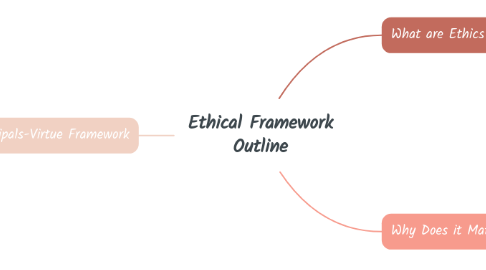
1. Guiding Principals-Virtue Framework
1.1. Integrity
1.1.1. Situation: A "good" student has a borderline grade. The teacher "fixes" the grade because the student is favored.
1.1.1.1. Devaluing grade integrity devalues the grading system and student work. If this is to be our metric with which we grade, it must be universal applied and honored.
1.2. Honesty
1.2.1. Situation: Students are caught cheating on a test. The teacher doesn't think it's worth the effort to "bust them."
1.2.1.1. Student accountability should be at the apex of our educational ideals. Failing to do so further teachers kids acceptance of breaking rules and sets them up for failure when consequences later in life are more extreme.
1.3. Fairness
1.3.1. Situation: A particular student is sent out more often than peers when others get away with the same behavior.
1.3.1.1. A teacher must try to withhold bias in behavior management. All students must be held to the same standards and expectations.
1.4. Value
1.4.1. Situation: A teacher doesn't think it's worth the time to help a struggling student because they are doing to fail anyway.
1.4.1.1. A teacher must see value in all students, regardless of grade status. The task is educating regardless of grade output. All students should be provided the same learning opportunities.
1.5. Responsibility
1.5.1. Situation: A student anonymously reports ongoing sexual abuse. What responsibility does the teacher have to determine the identity of the student and work to help them?
1.5.1.1. Teachers must work to ensure the safety of students. Making available resources and ways to get help readily available to all students was made a priority in this lesson.
1.6. Communication
1.6.1. Situation: A teacher has a tendency to lose their temper in class and curse/verbally assault students.
1.6.1.1. A teacher acts as a role model. A teacher must "be impeccable with...their...word." (Ruiz, 2001)
1.6.1.1.1. Ruiz, D. M. (2001). The four agreements. Amber-Allen Publishing.
1.7. Safety
1.7.1. Situation: A student self harms in a classroom while the teacher was present. How is the teacher copable?
1.7.1.1. A teacher must work to ensure the safety of all students, physical and mental. Although we deal with students with lots of trauma, it is out goal to make our classroom a safe space for students.
1.8. Trust
1.8.1. Situation: A student reports abuse but begs the teacher not to tell.
1.8.1.1. Although the teacher doesn't want to break the students trust, a teacher is a mandatory reporter and must work to ensure student safety.
1.9. Justice
1.9.1. Situation: A student has severely misbehaved in class and returned with no consequences.
1.9.1.1. Although it is desired for students to be held accountable, the teacher must accept all students back into the learning environment. We don't get to pick which students we want to to teach.
1.10. "Democracy in Education" (Geoke 2007)
1.10.1. Goeke, J., & Eldridge, D. (2007). Chapter 6: ETHICAL RESISTANCE IN TEACHER EDUCATION. In Ethical Educator: Integrating Ethics within the Context of Teaching & Teacher Research (pp. 49–56).
1.10.2. Situation: Are all topics free to teach? ie...Evolution, racism, gender inclusivity, gun control, abortion
1.10.2.1. A biased education leads to a biased individual. By teaching a wide spectrum of topics, controversial or not, we help create knowledgeable citizens who are free to make a choice given ALL the information available.
2. What are Ethics?
2.1. Moral principals that guide an individual choices
2.2. Doing what's "right"
2.3. Set of standards for behavior (Bonde 2011)
2.3.1. Bonde, S., & Firenze, P. (2011). A Framework for Making Ethical Decisions. A Framework for Making Ethical Decisions | Science and Technology Studies. Retrieved July 12, 2022, from https://www.brown.edu/academics/science-and-technology-studies/framework-making-ethical-decisions
3. Why Does it Matter?
3.1. As a a citizen?
3.1.1. Helps create successful societies
3.1.2. Foundation with which laws are built upon
3.2. As an educator?
3.2.1. Entrusted with educating youth
3.2.2. Role models for the future
